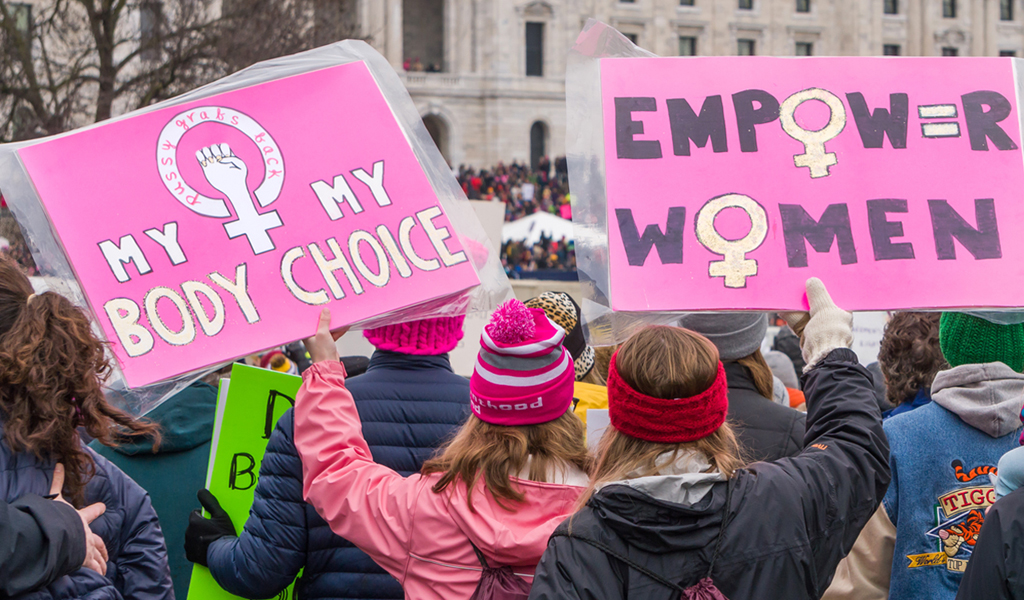The IDS Annual Lecture with Karuna Nundy on ‘Gender, Justice and Joy: Legal travels through the patriarchy, suppressed speech and corporate crime’, is less than one week away. In the last forty years IDS has made a unique contribution to the research, practice and learning on gender and development and here we take a look at the ongoing work by IDS, with partners globally, in the fight for progressing gender justice.

Countering the backlash
Despite hard worn progress on gender rights over the past century, recent political and social shifts have seen push back against women’s rights and gender justice, from the overturning of Roe v Wade in the US, the introduction of the Anti-homosexuality Act 2023 in Uganda and the death of Mahsa Amini in Iran, and the stricter headscarf law that followed.
In the face of this often coordinated and organised backlash, IDS researchers have been working in partnership with scholars and activists in Lebanon, Brazil, India, Bangladesh, UK, Kenya and Uganda through the Countering Backlash: Reclaiming Gender Justice programme.
Recent work has included partnering with The Centre for Health & Social Justice in India to highlight the experiences of transgender people in India as they fight for their rights, research on online violence against women in Bangladesh and a focused look at marriage equality in India, following the recent legal hearings at India’s Supreme Court.
As a leading international lawyer and feminist, IDS Annual Lecture speaker Karuna Nundy has been directly involved in leading arguments to legalise same sex marriage in India, and separately to criminalise marital rape in India. India is one around 30 countries in the world where marital rape is still not illegal and Karuna’s work on this important fight against gender-based violence continues.
Women’s movements
Across South Asia, women have struggled for decades to improve their lives, with women’s movements being critical in advancing their rights, yet they face new and multiple forms of backlash and contestations. The Sustaining Power: Women’s Struggles against contemporary backlash in South Asia’ (SuPWR) research collaboration based at IDS, is working with activists from 16 women’s struggles in Bangladesh, India, Nepal and Pakistan to examine when, how, and why women’s power struggles succeed in retaining power and sustaining their gains against backlash.
SuPWR approaches gender justice based on the understandings of. Women’s movements SuPWR works with includes Bangladesh Garment Workers’ Solidarity, Home Based Women Workers and the Aurat March and Aurat Azadi March, which are annual marches held in different cities in Pakistan organised to mark International Working Women’s Day, and to call for bodily, democratic, economic, and social rights of women and gender and sexual minorities.
Empowerment of women and girls
Other crucial elements of gender justice and development include economic empowerment and the role of unpaid care. Key publications on these areas include the 2016 IDS Bulletin Connecting Perspectives on Women’s Empowerment edited by Deepta Chopra and Catherine Müller, which contributes to our understanding of how ideas around empowerment have evolved and how we can move forward to expand women’s opportunities and choices and realise women’s empowerment in a meaningful way.
As part of a wider body of work since 2013 on the empowerment on women and girls, the notable report No Time to Rest: Women’s Lived Experiences of Balancing Paid Work and Unpaid Care Work was published, and the Who Cares animation that supported a UN special report.
Gender and Development
Alongside the wide range of research on gender and development, IDS delivers one of the longest running Masters in Gender and Development. The course provides students with the opportunity to explore the fundamentals of feminist theory and the knowledge to enhance policy and programming for gender equity. Through this master’s degree we aim to lay the groundwork and provide the tools needed for future gender and development researchers, leaders and activists. Notable alumni have gone to achieve great things in the field of development and social change. To find out more about the course and how to apply, click below.
In her IDS Annual Lecture on Tuesday 14 November, Karuna will share some of her own experiences during her career and her views on how patriarchy has been repackaged and has re-emerged in different forms globally. Justice for women and LGBTQI+ people still has a long way to go but Karuna will also discuss where the positive progress can be found and the importance of joy and achieving the freedom to flourish.
Register for the IDS Annual Lecture
